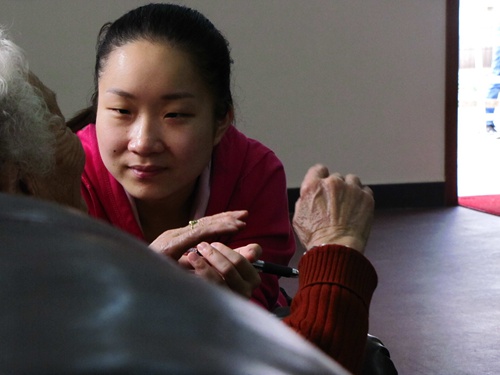|
 |
|
TO BE A LISTENER: Ma Xiaojing, Director of the Shanghai Hand in Hand Life Care Developing Center, looks after a patient with a terminal illness on November 18, 2011 (CFP) |
Palliative care
For Ma Xiaojing, a Shanghai resident who has been working as a volunteer providing palliative care for quite a few years, there are ways other than just prolonging a patient's life with medical devices that can make him or her feel better.
"Many people with terminal illnesses are in a lot of pain and are scared by the end of their lives, which also makes the relatives worry," Ma said. "But the way that their relatives relieve the worry is to send them to hospital and get more medical treatment."
Ma has been with many ailing people who have less than six months left. "They need patience and the company of their family members. Many seniors want to talk more about their memories and we need to be good listeners and chat with them during this difficult time," Ma said.
Ma once helped a 60-year-old man with uremia find a friend he lost contact with for more than 30 years and this became the man's happiest memory in the last days of his life.
"They need emotional care more than medical treatment after they accept the fact that there is only short time left for them," said Ma, who brings flowers for her patients as well as cards with warm words.
For Ma, who is working as director of Shanghai Hand in Hand Life Care Developing Center, the worry is how to get more investment and volunteers involved in palliative care.
According to Ma, There are about 50,000 patients diagnosed with cancer in Shanghai every year and more than 40,000 pass away in the same time frame. The number of volunteers working for these patients is only about 200 and some of the volunteers cannot work long hours.
The situation is the same in Beijing. Xiangning Palliative Care Center, affiliated with Beijing Cancer Hospital, declared its closure in 2010 after 10 years of operation due to a lack of financial support.
Beijing Songtang Palliative Care Center, founded in 1987 as the first one of its kind in China, also struggles with a lack of money and staff, according to President Zhu Lin.
"As China is facing an aging society, the demand for palliative care is growing but the current situation is not optimistic," Zhu said.
| 